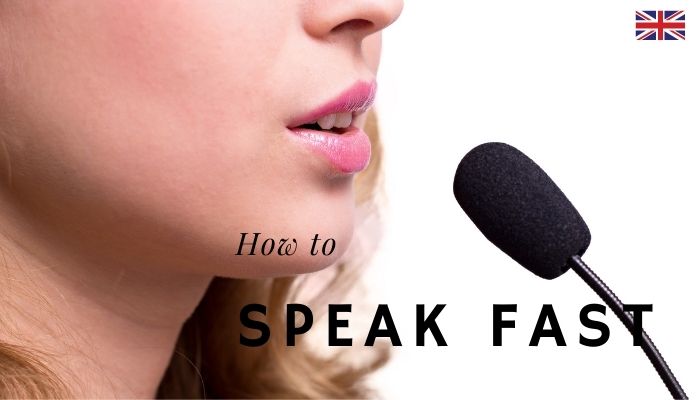Great site to keep my english skills updated for work and travel. I am really enjoying the lessons!
Maria C
 Argentinien
Argentinien


Viele Englischlerner bemerken, dass englische Muttersprachler dazu neigen, schnell zu sprechen, daher denken sie, dass schnelleres Sprechen ihr Englisch flüssiger klingen lässt. Aber Sie müssen vorsichtig sein – es kann gefährlich sein, zu versuchen, sehr schnell Englisch zu sprechen, wenn Sie diese Tipps nicht befolgen.
Warum? Nun, es gibt zwei Gründe. Zuallererst, wenn Ihre Aussprache nicht klar ist, wird es nur noch schlimmer, wenn Sie schneller sprechen – und andere Leute werden Sie nicht verstehen.
Und zweitens kann ein besonders schnelles Sprechen manchmal den Eindruck erwecken, dass Sie nervös oder unsicher sind, dass Sie nicht selbstbewusst sind. Dieser Tipp gilt auch für englische Muttersprachler – wenn jemand eine Meile pro Minute (also sehr schnell) spricht, kann dies dazu führen, dass er nervös oder unwohl ist oder nicht wirklich darüber nachdenkt, was er sagt. Also, wie ich schon sagte, pass auf, dass du nicht übertreibst (mach nicht zu viel), wenn du deine Sprechgeschwindigkeit erhöhst.
Erfahren Sie, wie Sie Ihre Englischkenntnisse verbessern und schneller Englisch sprechen können, indem Sie gängige informelle Kontraktionen auf Englisch verwenden.
Beispielsweise:
• What are you going to do?
• Whatcha going to do?
• Whatcha gonna do?
oder
• Do you want a beer?
• Do you wanna beer?
• D’you wanna beer?
• D’ya wanna beer?
• Ya wanna beer?
• Wanna beer?
GEMEINSAME INFORMELLE VERTRÄGE, UM WIE EIN EINZIGARTIGER ZU KLANGEN
Informelle Kontraktionen sind, wenn wir zwei oder mehr hochfrequente Wörter kombinieren, damit sie schneller gehen und leichter gesagt werden können. Muttersprachler tun dies automatisch. Wir sind es gewohnt, wichtige Wörter zu betonen und unwichtige zu reduzieren.
1. Ain’t = Am not/are not/is not
E.g. She ain’t hungry.
2. Ain’t = Has not/have not
E.g. He ain’t done it yet.
3. Wanna = Want to
E.g. I wanna go home.
4. Wanna = Want a
E.g. I wanna coffee.
5. Whatcha = What have you
E.g. Whatcha got there?
6. Kinda = Kind of
E.g. Anna’s kinda cute.
7. Sorta = Sort of
E.g. She’s sorta tired.
8. Outta = Out of
E.g. I’m outta money.
9. Alotta = A lot of
E.g. I eat alotta chocolate.
10. Lotsa = Lots of
E.g. He has lotsa money.
11. Mucha = Much of
E.g. It’s not mucha a surprise, is it?
12. Cuppa = Cup of
E.g. Would you like a cuppa tea?
13. Dunno = Don’t know
E.g. I dunno.
14. Lemme = Let me
E.g. Lemme see!
15. Gimme = Give me
E.g. Gimme the book!
16. Tell’em = Tell them
E.g. We should tell’em the truth.
17. Cos = Because
E.g. I cry cos I’m in pain.
18. Innit? = Isn’t it?
E.g. It’s blue, innit?
19. I’mma = I’m going to
E.g. I’mma talk to my mother.
20. Gonna = Going to
E.g. I’m gonna tell you the truth.
21. Needa = Need to
E.g. You needa know about Jame.
22. Oughta = Ought to
E.g. You oughta phone your brother.
23. Hafta = Have to
E.g. We hafta go.
24. Hasta = Has to
E.g. John hasta work today.
25. Usta = Used to
E.g. She usta live in France.
26. Supposta = Supposed to
E.g. I’m supposta start a new job on Monday.
27. Cmon = Come on
E.g. Cmon, let’s do it together!
28. Ya = You/ you are
E.g. I miss ya.
29. Gotta = (have) got a
E.g. Have you gotta phone?
30. Shoulda = Should have
E.g. She shoulda called yesterday.
31. Shouldna = Shouldn’t have
E.g. I’m sorry, I shouldna told you that.
32. Wouldna = Wouldn’t have
E.g. I wouldna done that if I were you.
33. She’da = She would have
E.g. She’da been prepared for class.
34. Coulda = Could have
E.g. He coulda been here by 5:00.
35. Woulda = Would have
E.g. He woulda arrived soon.
36. Mighta = Might have
E.g. You mighta left the book at the airport.
37. Mightna = Mightn’t have
E.g. She mightna caught her train.
38. Musta = Must have
E.g. She musta been in a hurry.
39. Mussna = Must not have
E.g. You mussna stolen the money.
40. Dontcha = Don’t you
E.g. Dontcha see it?
41. Wontcha = Won’t you
E.g. Wontcha watch this film?
42. Whatcha = What are you
E.g. Whatcha doing?
43. Betcha = Bet you
E.g. Betcha can’t guess who she is!
44. Gotcha = Got you
E.g. We gotcha!
45. D’you = Do you
E.g. D’you like him?
46. Didntcha = Didn’t you
E.g. Didntcha like this book?
47. S’more = Some more
E.g. I will need s’more time.
Nachdem Sie diesen Artikel gelesen haben, hoffe ich, dass Sie sich viel sicherer fühlen, diese informellen Kontraktionen zu verstehen und schließlich zu verwenden.
Überprüfen Sie Ihre Punktzahl - Testen Sie unser kostenloses Englisch-Quiz + erhalten Sie einen kostenlosen Bonus